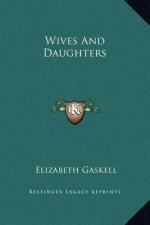and perhaps this was owing to the fact that the squire,
Roger Hamley, who at present lived and reigned at
Hamley, had not received so good an education as he
ought to have done. His father, Squire Stephen,
had been plucked at Oxford, and, with stubborn pride,
he had refused to go up again. Nay, more! he
had sworn a great oath, as men did in those days, that
none of his children to come should ever know either
university by becoming a member of it. He had
only one child, the present squire, and he was brought
up according to his father’s word; he was sent
to a petty provincial school, where he saw much that
he hated, and then turned loose upon the estate as
its heir. Such a bringing up did not do him all
the harm that might have been anticipated. He
was imperfectly educated, and ignorant on many points;
but he was aware of his deficiency, and regretted
it in theory. He was awkward and ungainly in
society, and so kept out of it as much as possible;
and he was obstinate, violent-tempered, and dictatorial
in his own immediate circle. On the other side,
he was generous, and true as steel; the very soul
of honour in fact. He had so much natural shrewdness,
that his conversation was always worth listening to,
although he was apt to start by assuming entirely
false premisses, which he considered as incontrovertible
as if they had been mathematically proved; but, given
the correctness of his premisses, nobody could bring
more natural wit and sense to bear upon the arguments
based upon them.
He had married a delicate fine London lady; it was
one of those perplexing marriages of which one cannot
understand the reasons. Yet they were very happy,
though possibly Mrs. Hamley would not have sunk into
the condition of a chronic invalid, if her husband
had cared a little more for her various tastes, or
allowed her the companionship of those who did.
After his marriage he was wont to say he had got all
that was worth having out of that crowd of houses they
called London. It was a compliment to his wife
which he repeated until the year of her death; it
charmed her at first, it pleased her up to the last
time of her hearing it; but, for all that, she used
sometimes to wish that he would recognize the fact
that there might still be something worth hearing
and seeing in the great city. But he never went
there again, and though he did not prohibit her going,
yet he showed so little sympathy with her when she
came back full of what she had done on her visit that
she ceased caring to go. Not but what he was kind
and willing in giving his consent, and in furnishing
her amply with money. ’There, there, my
little woman, take that! Dress yourself up as
fine as any on ’em, and buy what you like, for
the credit of Hamley of Hamley; and go to the park
and the play, and show off with the best on ’em.
I shall be glad to see thee back again, I know; but
have thy fling while thou art about it.’
Then when she came back it was, ’Well, well,
it has pleased thee, I suppose, so that’s all




